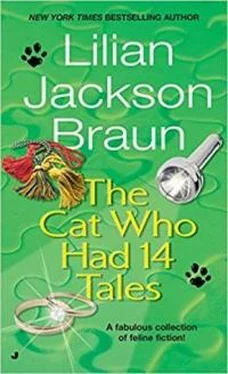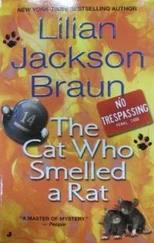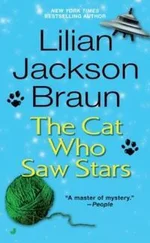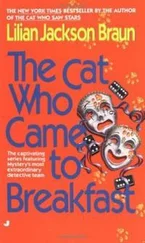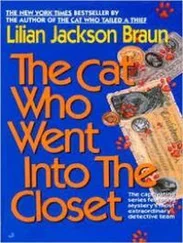“She’s all right. She’s in intensive care,” he said in his hooting voice. “But you never know. At her age she could go off like that. ” He looked at Ms. Finney’s left hand. “Better tell them to put something on your scratches, Rhoda. How’s Marmalade? Is he feeling better?”
“He’s getting less antisocial,” I volunteered. “He brought me a mouse a few minutes ago.”
“He was mad as a hornet when I got here this morning,” Mr. Tibbitt said. “Growling and spitting and pacing the floor like a tiger in a cage. Too bad he can’t tell us what happened last night. I’ve just come from the police station. Gave them what information I could. This town used to have a one-man police force. All he had to do was help the children cross Main Street and drive the heavy tipplers home on Saturday night. Then the tourists started coming up here and we had to buy three police cars.”
The garrulous Rhoda Finney departed, leaving me with the garrulous Mr. Tibbitt. Now, I hoped, I could ask questions and receive answers. “Do you think the vandals were vacationers?”
“No, this is one thing we can’t blame on the tourists. There’s something I didn’t mention in front of Rhoda; didn’t want to have to call the ambulance again. Did you hear about the three convicts that escaped yesterday?”
I vaguely remembered an item on a radio newscast.
“One of them was a member of the Lockmaster family,” Mr. Tibbitt said.
“Dennis the Disappointment?”
“I see Rhoda has been telling family secrets. Yes, they caught the other two in a swamp, but Dennis is still at large. He won’t get far. He’s not smart enough.”
“Do you think it was Dennis who wrecked the drawing room?”
“No doubt about it. He knew how to get into the house—through the chute where they used to deliver coal in the old days.”
“Was it retaliation for being disinherited? Why did he concentrate on the drawing room? Why didn’t he just burn the house down?”
“Not smart enough to think of it. The police found a screwdriver on the floor, and they think he intended to mutilate his father’s portrait over the organ. He’s a sick boy. Whatever he was trying to do, the cat evidently stopped him. Those sharp fangs could tap a vein, you know. The way I figure it, Dennis was creeping into the dark room and stepped on Marmalade’s tail, and all of a sudden he’s attacked by seven wildcats, all screeching and biting and clawing.”
“So your official mouser doubles as a security guard?”
“Well, I have a theory,” Mr. Tibbitt said with a glint of excitement in his filmy eyes. “Marmalade spends most of his time watching the back corner of the organ when he isn’t sleeping, and I think there’s an important mousehole behind it. He always gets perturbed when I plug up one of his mouseholes, but I’ve never seen him so mad as he was this morning.”
“No wonder!” I said. “He thought someone was threatening his prime source of supply.”
“Let’s try an experiment to test my theory,” Mr. Tibbitt said, heading for the drawing room with a brisk but jerky gait.
I followed. The cat was there, watching the organ, with his body bunched up and his head thrust forward. He was the essence of concentration.
“Walk toward the organ,” Mr. Tibbitt instructed me, “and let’s see how he reacts.”
“Are you kidding?” I protested. The retired school principal was not kidding, and reluctantly I moved into the room, slowly and quietly. Marmalade’s ears swiveled. He was listening. I moved closer, and he turned his head. Seeing me, he jumped up and glared at me with threatening yellow eyes.
“Keep going,” said Mr. Tibbitt from his safe post in the entranceway.
The cat’s back arched and his tail ballooned and he bared his murderous-looking fangs. This was the animal that had rubbed my ankles affectionately and had brought me a gift! I took one more step, and he turned into a howling, snarling maniac. With a shriek I ran back to safety, knocking over a Meissen plant stand in the process.
“See? I was right,” Mr. Tibbitt announced.
“Thanks a lot,” I said.
In the weeks following the Lockmaster experience I researched ten more small-town museums throughout the state. What they lacked in old masters, African spears, and Fabergé eggs, they made up in serenity. The attendants said only, “Please sign the book,” and “Thank you for coming.” There were no belligerent mousers or bloodied rugs.
In each town I perused local newspapers and listened to the obituaries and bowling scores on local radio; there were no follow-up stories on the Lockmaster break-in or the escaped convict. Only the evidence in the little black box convinced me I had not dreamed the entire episode.
At last I started for home, and on the freeway I came to an exit fifty miles from the Lockmaster Museum. I decided to take a detour. Reaching the museum during visiting hours, I found several cars parked at the curb and not a police car in sight. A sign in the door said: OPEN—WALK IN.
The mild-mannered, white-haired attendants sat at the reception desk, discussing arthritis. “Please sign the guest book,” said one of them. “Catalogs are three dollars,” said the other.
The drawing room was now in perfect order, and visitors tiptoed through the rooms, speaking in whispers. In vain I looked for Rhoda Finney and Marmalade and Mr. Tibbitt . . . . It had been a dream; the little black box lied!
I wandered through the main floor, then climbed the twenty-two stairs to have another look at the black onyx bathroom and the Fabergé eggs. And there—among the peach velvet draperies and peach satin boudoir chairs—I found an old man in a dark business suit, down on his knees, plugging a mousehole. The work was being supervised by a sleek gray cat!
“Mr. Tibbitt!” I cried. “Remember me? Where’s Marmalade?”
He struggled to his feet, unlocking one joint at a time. “Marmalade took early retirement,” he said in the thin high-pitched voice I remembered. “The poor cat went off his rocker completely, harassing visitors and intimidating the volunteer guides. He never got over his bad experience. He lives with me now.”
“Does he miss his rich diet of mice?”
“No, no, no. He never ate mice. He was strictly a professional mouser. The guides always fed him regular catfood.”
“And what about Dennis the Disappointment? I haven’t heard a thing!”
“He’s back in prison, I’m glad to say,” said Mr. Tibbitt. “And they found the jewels.”
“What jewels?”
“Why, the priceless gems that had been in the family since 1850! It was Dennis who had stolen them. He was living here then, and he hid them in the house, thinking he’d retrieve them when the investigation cooled off. Jewelers all over the world were on the lookout for the stuff, and it was right here in the house all the time. When Dennis escaped, he came back to collect his loot. Of course, he didn’t succeed. Never succeeded at anything, that boy.”
“Who found the jewels? And how did they know they were on the premises?”
“Let me sit down and rest a minute. I’m getting old,” Mr. Tibbitt said, looking for a chair that was not peach satin or velvet. We found a black horsehair bench in the onyx bathroom, and he went on: “The detectives started noticing Marmalade’s behavior, and they got suspicious about the organ. They remembered the unsolved case of the stolen jewels.”
“But Marmalade was interested in mice, not music.”
“Anyway, they brought in an expert on reed organs, and they told him about the screwdriver. The police found a screwdriver near the organ, near the family portraits. Do you remember?”
I remembered.
Читать дальше
